

Public Accountability Initiative. How a University of Texas Fracking Study Led by a Gas Industry Insider Spun the Facts and Misled the Public PAI continues to investigate fracking industry influence on academic research with this report on a University of Texas study of fracking that claimed that the drilling practice had never been linked to groundwater contamination.
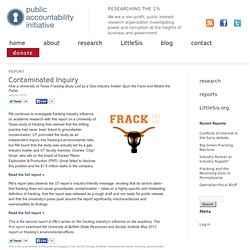
UT promoted the study as an independent inquiry into fracking’s environmental risks, but PAI found that the study was actually led by a gas industry insider and UT faculty member, Charles “Chip” Groat, who sits on the board of fracker Plains Exploration & Production (PXP). Groat failed to disclose this position and his $1.6 million stake in the company. University of Texas to Review Report on Gas Fracking Impacts. The University of Texas at Austin will assemble a group of independent experts to review its February report on gas fracking after reports said the professor who led the study is on the board of a gas driller.
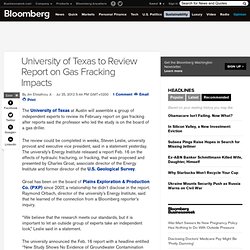
The review could be completed in weeks, Steven Leslie, university provost and executive vice president, said in a statement yesterday. The university’s Energy Institute released a report Feb. 16 on the effects of hydraulic fracturing, or fracking, that was proposed and presented by Charles Groat, associate director of the Energy Institute and former director of the U.S. Geological Survey. Groat has been on the board of Plains Exploration & Production Co. (PXP) since 2007, a relationship he didn’t disclose in the report. “We believe that the research meets our standards, but it is important to let an outside group of experts take an independent look,” Leslie said in a statement. Texas Professor On the Defensive Over Fracking Money.
Photo courtesy of the University of Texas at Austin's Energy Institute Dr.
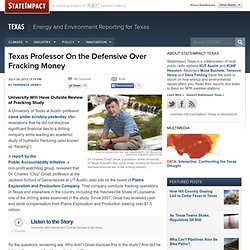
Charles "Chip" Groat, a professor at the University of Texas at Austin, has come under scrutiny for failing to disclose financial ties to the drilling industry. University Will Have Outside Review of Fracking Study A University of Texas at Austin professor came under scrutiny yesterday after revelations that he did not disclose significant financial ties to a drilling company while leading an academic study of hydraulic fracturing (also known as “fracking”). A report by the Public Accountability Initiative, a non-profit watchdog group, revealed that Dr.
Frackers Fund University Research That Proves Their Case. Pennsylvania remains the largest U.S. state without a tax on natural gas production, thanks in part to a study released under the banner of the Pennsylvania State University.
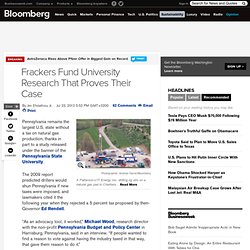
The 2009 report predicted drillers would shun Pennsylvania if new taxes were imposed, and lawmakers cited it the following year when they rejected a 5 percent tax proposed by then- Governor Ed Rendell. “As an advocacy tool, it worked,” Michael Wood, research director with the non-profit Pennsylvania Budget and Policy Center in Harrisburg, Pennsylvania, said in an interview.
“If people wanted to find a reason to vote against having the industry taxed in that way, that gave them reason to do it.” What the study didn’t do was note that it was sponsored by gas drillers and led by an economist, now at the University of Wyoming, with a history of producing industry-friendly research on economic and energy issues. The researcher, Tim Considine, said his analysis was sound and not biased by industry funding. When Agendas Meet Science in the Gas Drilling Fight. Frackademia: noun – An academic aligned with frackers. Contaminated Inquiry: Prof with Money Ties to Industry Led Fracking Study. A recent University of Texas study, which claims to prove that the natural gas extraction process known as fracking does not cause environmental damage or water contamination, was led by a gas industry insider who currently holds up to $1.6 million in stock at a large fracking company.
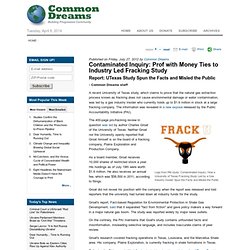
FreezePage. Is the Natural Gas Industry Buying Academics? McDonnell/West Last week the University of Texas provost announced he would reexamine a report by a UT professor that said fracking was safe for groundwater after the revelation that the professor pocketed hundreds of thousands of dollars from a Texas natural gas developer.
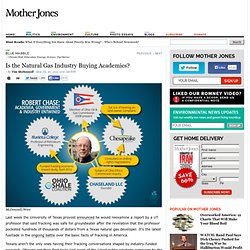
It's the latest fusillade in the ongoing battle over the basic facts of fracking in America. Texans aren't the only ones having their fracking conversations shaped by industry-funded research. Ohioans got their first taste last week of the latest public-relations campaign by the energy policy wing of the US Chamber of Commerce. It's called "Shale Works for US," and it aims to spend millions on advertising and public events to sell Ohioans on the idea that fracking is a surefire way to yank the state out of recession. "It's hard to find someone who's truly independent and doesn't have at least one iron in the fire," said Ohio oil and gas lease attorney Mark F.
About USGS: Charles G. Groat. Director Charles G.
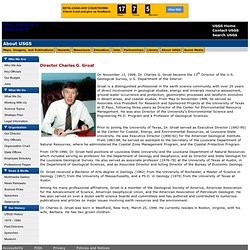
Groat On November 13, 1998, Dr. Charles G. Groat became the 13th Director of the U.S. Geological Survey, U.S. Groat is a distinguished professional in the earth science community with over 25 years of direct involvement in geological studies, energy and minerals resource assessment, ground-water occurrence and protection, geomorphic processes and landform evolution in desert areas, and coastal studies. Prior to joining the University of Texas, Dr. From 1978-1990, Dr. Dr. Among his many professional affiliations, Groat is a member of the Geological Society of America, American Association for the Advancement of Science, American Geophysical Union, and the American Association of Petroleum Geologist.
Dr.